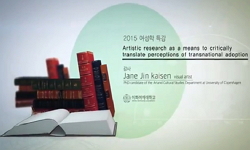In this paper, I examine Nathanael West’s A Cool Million, or the Dismantling of Lemuel Pitkin (1934) as a narrative exploring the (im)possibility of an orphan’s adoption into American society. West satirizes the Horatio Alger rags-to-riches narrat...
http://chineseinput.net/에서 pinyin(병음)방식으로 중국어를 변환할 수 있습니다.
변환된 중국어를 복사하여 사용하시면 됩니다.
- 中文 을 입력하시려면 zhongwen을 입력하시고 space를누르시면됩니다.
- 北京 을 입력하시려면 beijing을 입력하시고 space를 누르시면 됩니다.

The Impossible Adoption: West’s Critique of Horatio Alger’s Myth and American Identity in Nathanael West’s A Cool Million, or the Dismantling of Lemuel Pitkin
한글로보기https://www.riss.kr/link?id=A109406205
-
저자
YANGJULIEKYU (-)
- 발행기관
- 학술지명
- 권호사항
-
발행연도
2024
-
작성언어
English
- 주제어
-
등재정보
KCI등재
-
자료형태
학술저널
-
수록면
73-95(23쪽)
- 제공처
-
0
상세조회 -
0
다운로드
부가정보
다국어 초록 (Multilingual Abstract)
In this paper, I examine Nathanael West’s A Cool Million, or the Dismantling of Lemuel Pitkin (1934) as a narrative exploring the (im)possibility of an orphan’s adoption into American society. West satirizes the Horatio Alger rags-to-riches narrative—a central national myth that persisted despite economic downturns and political unrest in early twentieth-century America. Lem begins as a hero with humble, rural origins, ventures into the city, overcomes life-threatening dangers, and appears to be the ideal candidate for a bildungsroman narrative. However, instead of being set on a path to success like the traditional Alger hero, even a white “American boy” possessing all the traits of a potential hero in Alger’s stories is ultimately destroyed by capitalism and exploited as fascist propaganda posthumously. By complicating this “perfect” candidate, who could have embodied and represented American ideals, West critiques not only the viability of the American cultural myth but also the failure of the country to protect the vulnerable.
동일학술지(권/호) 다른 논문
-
틸리 올슨의 「여기 서서 다림질하고 있지요」에서 그려지는 다림질하는 어머니의 초상화와 감정적 모성
- 미국소설학회
- 차희정
- 2024
- KCI등재
-
Post-Racial Vision, Racial Transcendence, and Racial Violence in George Schuyler’s Black No More
- 미국소설학회
- 박지니
- 2024
- KCI등재
-
가족과 자신에게 바치는 헌사: 올컷의 「초월주의의 야생 귀리」에 나타난 이상과 현실의 조율
- 미국소설학회
- 손정희
- 2024
- KCI등재
-
“Bigger as I saw and felt him”: Emotion and Knowing in Native Son
- 미국소설학회
- 이승희
- 2024
- KCI등재




 KCI
KCI KISS
KISS




